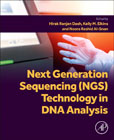
Next Generation Sequencing (NGS) Technology in DNA Analysis
Dash, Hirak Ranjan
Elkins, Kelly M.
Al-Snan, Noora Rashid
Next Generation Sequencing (NGS) Technology in DNA Analysis explains and summarizes next generation sequencing (NGS) technological applications in the field of forensic DNA analysis. The book covers the transition from capillary electrophoresis (CE)-based technique to NGS platforms and the fundamentals of NGS technologies, applications, and advances. Sections provide an overview of NGS technology and forensic science, including information on processing biological samples for forensic analysis, sequence analysis, and data analysis software as well as the analysis of NGS data. The book explores the valuable applications of NGS-based forensic DNA analysis and covers the validations and interpretation guidelines of NGS workflows. With chapter contributions from an international array of experts and the inclusion of practical case studies, this book is a useful reference for academicians and researchers in genetics, biotechnology, bioinformatics, biology, and medicine as well as forensic DNA scientists and practitioners who aim to learn, use, apply, and validate NGS-based technologies. Describes the fundamentals of NGS and its advances for forensic applications Explains the transition from CE-based technique to NGS technology Includes case studies related to NGS and DNA fingerprinting Explores the future use and applications of NGS technologies INDICE: SECTION 1 Useful applications of NGS-based forensic DNA analysis 1. Transition of capillary electrophoresis to next generation sequencing for forensic DNA analysis: Need of the hour 2. Using conventional STR technology in analyzing biological transfer evidence 3. Overview of NGS platforms and technological advancements for forensic applications 4. Processing of biological samples for forensic NGS analysis 5. Commercial kits commonly used for NGS based forensic DNA analysis 6. Applications of nanopore sequencing for forensic analysis 7. Microhaplotypes analysis for human identification using next-generation sequencing (NGS) 8. Tools and techniques of using NGS technology in population studies SECTION 2 Useful applications of NGS-based forensic DNA analysis 9. Applications of NGS in analysis of autosomal STRs 10. Differentiating monozygotic twins using NGS 11. Application of NGS in maternal genome analysis in ancient human remains 12. Application of NGS technology for parentage testing and relatedness analysis 13. Forensic relevance of SNP analysis in next-generation sequencing 14. Forensic analysis of hair using NGS technology 15. Forensic DNA phenotyping using next-generation sequencing 16. Forensic DNA phenotyping in the next-generation sequencing era 17. Forensic applications of epigenetic (DNA methylation) markers through NGS 18. Forensic applications of NGS-based microRNA analysis 19. NGS profiling of water and soil microbial DNA in forensic science 20. Applications of NGS in analysis of challenging samples 21. Detection of human body fluid through mRNA analysis using NGS 22. NGS-based detection and differentiation of forensically relevant body fluids using conventional, molecular, and microbial techniques 23. Application of next-generation sequencing technology and investigative genetic genealogy to cold cases SECTION 3 Challenges in implementing NGS in forensic laboratories 24. Troubleshooting and challenges of Next-generation sequencing technology in forensic use 25. Validation of NGS for casework at forensic DNA laboratories 26. Challenges in using genetic genealogy in forensics 27. The role of artificial intelligence and machine learning in NGS 28. Ethical issues of forensic application of NGS technology 29. Ethical, legal, and social challenges of next-generation sequencing technologies (NGS) in forensic criminal identification
- ISBN: 978-0-323-99144-5
- Editorial: Academic Press
- Encuadernacion: Rústica
- Páginas: 612
- Fecha Publicación: 01/12/2023
- Nº Volúmenes: 1
- Idioma: Inglés
